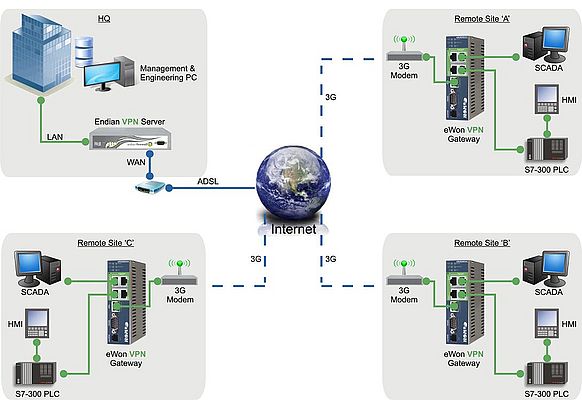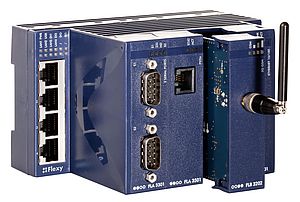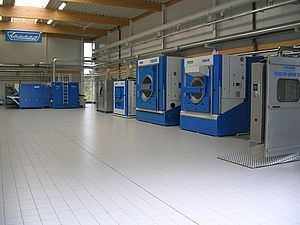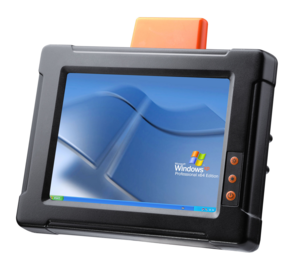By installing eWON industrial-grade Ethernet routers, 3G modems and a VPN server box – that offer secure, Internet-based remote control and diagnostics – suppliers of equipment for crematoria can now remotely monitor and control human cremators from anywhere in the world using a secure Internet connection.
The solution also acts as an early warning system for crematorium operators, helping to detect any impending component failures. These types of remote solution save significant time and minimise the cost of service engineer call-outs.
Automation Integration Ltd is a systems integrator based in Crawley, West Sussex. The company designs, engineers and installs control and automation equipment, including PLC controls and SCADA systems, to a wide range of industry sectors.
One such industry is crematoria. In recent years, UK-based crematoria have come under pressure from the Government with regard to pollution control. Several years ago, Environment Agency studies found that crematoria were the fastest rising source of mercury emissions in England and Wales. Emissions of mercury, a heavy metal that is toxic if it finds its way into food or crops, were rising fast due to the number of fillings in people’s teeth who were cremated. Mercury is not poisonous when locked up in amalgam, but becomes so again when the amalgam melts at high temperatures.
Traditionally, crematory systems use bespoke control systems. However, off-the-shelf, fully integrated PLC systems are now available in order to monitor and control all aspects and functions of a crematory, to ensure safe, efficient and reliable system operation. Automation Integration provides PLC control systems developed specifically to suit the manufacturer’s process cycle and abatement system. A simple one-button command by the operator will take the crematory through its programmed cycles in a safe and predetermined manner. The PLC can continuously monitor all vital functions and provides LED system status display, along with current operating temperatures and burner status. Control systems such as these provide superior fuel and airflow control capability that allow for very cost efficient, simplified operation.
Steve Mays, Director at Automation Integration comments: “In a recent project at a UK-based crematorium, the new control system that we supplied comprised Siemens S7 PLCs, HMIs and a SCADA system, which were located in a control cabinet at the crematorium. However, because the cremator used a new process cycle, we had to keep sending a service engineer to site in order to check and monitor the system.”
According to Mays, his customer wanted to know if there was a way in which the system could be controlled and monitored remotely in order to save the costs of an engineer having to visit site if there was a problem. “We spoke to the local authority who owned the crematorium, to see if we could install a Broadband connection. However, this was declined because the local authority did not wish its IT department to take over responsibility for the connection to the crematorium. We therefore had to look for an alternative solution.”
Automation Integration looked at the UK market for potential solutions, finally selecting M.A.C Solutions (UK) Ltd as its preferred supplier. The solution provided by M.A.C Solutions is totally secure and enables Automation Integration to provide control systems for cremators that can be remotely monitored and controlled from anywhere in the UK.
The equipment supplied by M.A.C Solutions enables the two cremators, the abatement system and the SCADA software to be networked at site. Three eWON Ethernet routers are connected to 3G modems at three separate sites, each housed in a control panel that is fixed to the wall next to the cremator. These are then connected to the Internet using a BT simcard.
The ‘eWON’ range of industrial routers complies with a wide range of serial and Ethernet-based PLCs, including Siemens, Rockwell Automation, Schneider Electric and Omron.
M.A.C Solutions also supplied one ENDIAN VPN server box, which is located at Automation Integration’s head office in Crawley. This provides a totally secure, always-on VPN connection to multiple crematorium sites if required. This enables the two Automation Integration service engineers to access the PLCs at any time from their own office. Modifications to the PLC can be carried out, including changing process cycles and system parameters. “It’s as if the service engineer is physically at the crematorium accessing the control panel and PLC,” enthuses Mays.
As Mays explains: “Previously, if a fault occurred on a cremator such as a thermocouple failing or the burner losing efficiency, a service engineer would have to travel to site to rectify the problem. Now, the remote system enables the engineers to constantly monitor the cremator and abatement system. We’ve even programmed in early warning alarms so that the system can tell us when a thermocouple is starting to deteriorate, rather like a condition monitoring system. We can even give the Environment Agency or the local authority access to the reporting side of the system, providing them with monthly or quarterly emissions reports on the cremator.”
“Since installing the new system, no service engineer has had to visit the site and we’ve been able to implement the new process cycle without getting in the operator’s way. What I also like about MAC Solutions’ products is that we can use them for other projects outside of the crematorium sector, as the system can be easily adapted for other industries,” states Mays.





















